Seasonal changes bring varying demands on your home's heating and cooling systems. A heat pump that functions optimally throughout the year requires attention to its specific maintenance needs as seasons change. Adapting to different temperatures and humidity levels ensures that your system runs efficiently, providing comfort and reliability when you need it most.
From preparing for winter’s chill to transitioning back to the milder temperatures of spring, understanding what your heat pump requires during these times is essential. Performing timely inspections and upkeep not only prevents disruptions but also extends the life of your equipment. Recognizing the importance of seasonal adjustments and regular checks, especially in summer’s peak heat, will keep your heat pump in excellent condition.
Updates and tune-ups performed by our skilled professionals further guarantee that any underlying issues are addressed before they evolve into major repairs. This foresight makes it easier to maintain a seamless indoor climate, no matter what the season brings. By incorporating these seasonal considerations, you can be confident that your heat pump will serve your home efficiently and effectively year-round.
As temperatures begin to drop, ensuring your heat pump is ready for the colder months is crucial to maintaining warmth and efficiency. Before the winter chill sets in, a thorough inspection of the system for any signs of wear or damage is essential. Identifying problems early can prevent unexpected breakdowns when the system is most needed. Look for any visible damage to the outdoor unit, including bent fins or clogged vents, as these can impact performance.
To prepare the heat pump for efficient operation during fall and winter, follow these important steps:
- Check and Replace Air Filters: Dirty or clogged filters can reduce airflow, forcing the system to work harder. Clean or replace filters regularly to ensure optimal performance.
- Inspect Thermostat Settings: Ensure the thermostat is calibrated and set to the correct settings for heating mode. Proper calibration avoids unnecessary energy use and keeps your home comfortable.
- Examine and Clear Outdoor Unit: Remove debris, leaves, or twigs that may have accumulated around the unit. Keeping the area clear promotes effective air circulation.
- Check Insulation: Proper insulation prevents heat loss and ensures the heat pump doesn't overwork to maintain the desired indoor temperature.
Routine maintenance ahead of the coldest months helps preserve system efficiency and reliability, warding off costly emergencies and enhancing overall home comfort.
As winter gives way to milder temperatures, transitioning your heat pump from heating to cooling mode is necessary. Taking proactive steps ensures the system operates smoothly and without trouble during spring and beyond:
- Recalibrate the Thermostat: Adjust the settings for the warmer weather to maximize energy efficiency and maintain optimal indoor temperatures.
- Clean or Replace Air Filters: Filters should be checked and replaced if needed. Spring allergens and particles can accumulate, affecting indoor air quality.
- Inspect and Clean Coils: Both indoor and outdoor coils should be free of dust and debris to function effectively. Clean coils improve efficiency and prevent strain on the system.
- Check Refrigerant Levels: Proper refrigerant levels are crucial for effective cooling. Our professionals can measure and adjust levels as needed.
Scheduling a professional check-up after winter ends is wise. This allows our technicians to address any wear or issues from the intense use during the colder months. Early detection of problems, such as leaks or worn parts, keeps your heat pump running efficiently, helping you avoid unexpected repairs or replacements as the seasons change. Regular maintenance also contributes to a seamless transition and extends the life of the HVAC system.
During mid-summer, your heat pump works hard to keep your home cool and comfortable. To maintain system efficiency, it's essential to implement timely maintenance practices. One of the first steps is to ensure clear airflow throughout the system. Check that air vents and registers are unobstructed by furniture or other objects. Free-flowing air enhances the effectiveness of your cooling system, allowing for consistent temperature regulation.
Inspecting the outdoor unit is also crucial. Make sure it's free from overgrown plants or debris, as these can block the unit and hinder its performance. Routine cleaning with a hose can remove dirt and pollen that accumulate, ensuring the unit functions at its best. Regular maintenance of the outdoor unit prevents inefficiencies that result in higher operating costs.
Monitoring system performance allows you to spot irregularities early. Listen for unusual noises and watch for fluctuating temperatures in your home. These may indicate emerging problems that could worsen if left unattended. Taking swift action to adjust usage patterns or scheduling a professional inspection can address issues before they escalate.
Optimizing the heat pump's operation during peak cooling months through these proactive measures contributes to a seamless summer experience, with reliable cooling and reduced energy consumption.
To ensure the longevity and reliable performance of your heat pump, an annual professional inspection and tune-up is vital. Our technicians possess the skills and knowledge to conduct a detailed assessment, identifying and addressing small problems before they turn into costly repairs. This yearly inspection is an important preventative measure that keeps your system operating smoothly.
A comprehensive tune-up also involves checking and calibrating essential components of the heat pump. This process keeps the system running at its peak efficiency, minimizing energy use and operational wear. Tasks performed during a professional tune-up include cleaning coils, checking refrigerant levels, and verifying the condition of electrical connections.
Regular expert servicing goes beyond surface maintenance, providing peace of mind by ensuring your system is safe and ready for the changing seasons. It not only extends the lifespan of the heat pump but also enhances comfort and efficiency in your home all year long.
Seasonal heat pump maintenance protects your investment in home comfort and enhances the efficiency and lifespan of your HVAC system. By following specific seasonal maintenance tasks, from setting up the system for winter use to preparing for summer cooling, you ensure a consistent and comfortable indoor environment. The importance of professional tune-ups and inspections cannot be overstated, as they play a pivotal role in maintaining the system's performance and preventing unexpected breakdowns.
Choosing a proactive approach to heating and cooling management allows you to enjoy a hassle-free experience throughout the year. With each season comes a new opportunity to optimize your system's operation, reduce energy consumption, and improve your family's comfort.
Ensure your heat pump is prepared for all seasons with expert heat pump services in Halifax from Presidential Ventilation Systems Ltd. Our professionals offer tailored solutions to meet your specific needs, delivering reliability and efficiency in your home's heating and cooling systems. Contact us today to experience the benefits of our dedicated service.
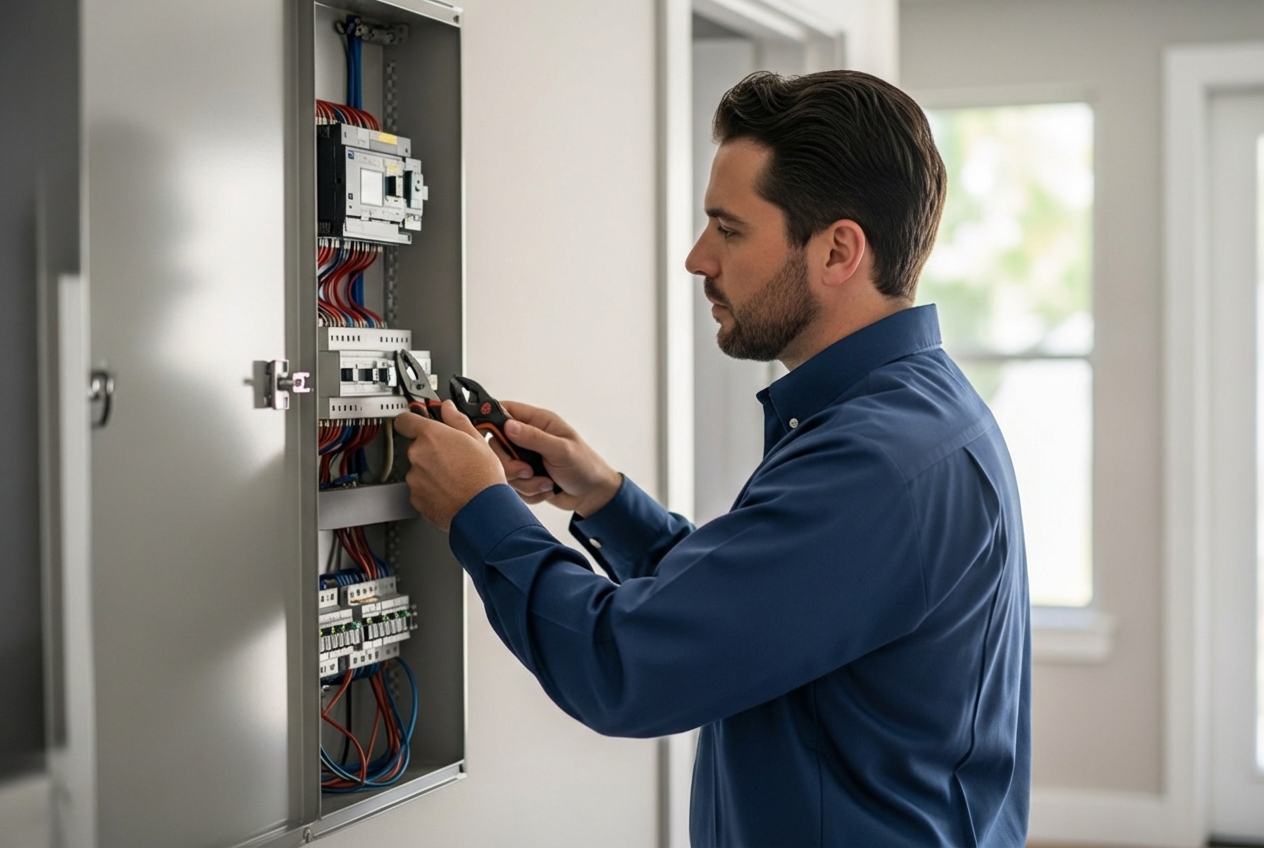

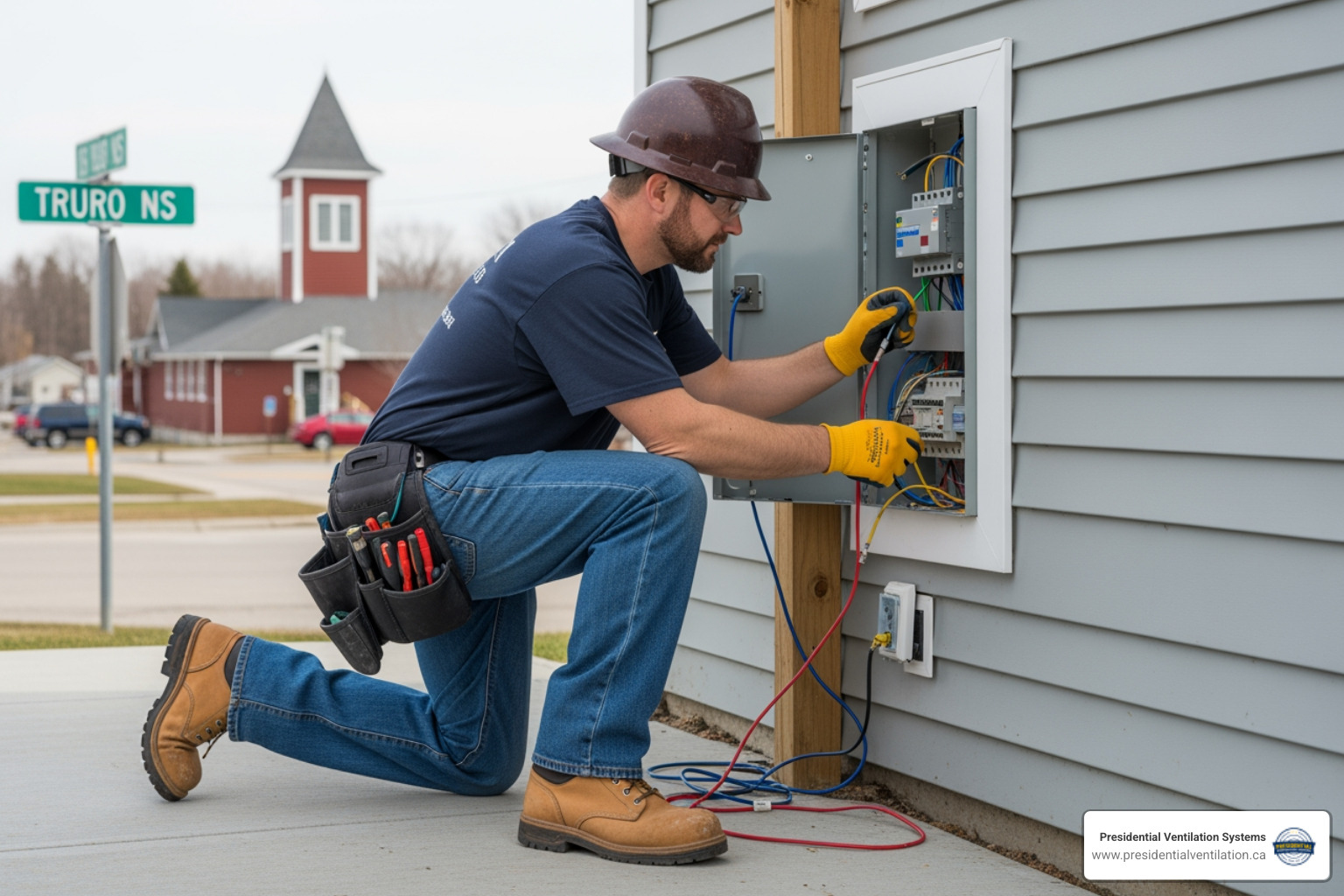
If you need a licensed electrician in truro, ns, you're making the right choice by looking for qualified professionals. Electrical work is not something to take lightly. Poor installations or repairs can lead to house fires, equipment damage, and serious safety hazards. In Truro and throughout Colchester County, homeowners and business owners rely on licensed electricians to keep their properties safe, up to code, and running smoothly. Whether you're planning a renovation, upgrading your panel, or wiring a new heat pump, working with a licensed professional protects your investment and gives you peace of mind.
For expert guidance on electrical projects, check out our Electrical Wiring Guide 2025, and when you're ready to move forward, contact us for your Electrical Services in Truro NS.
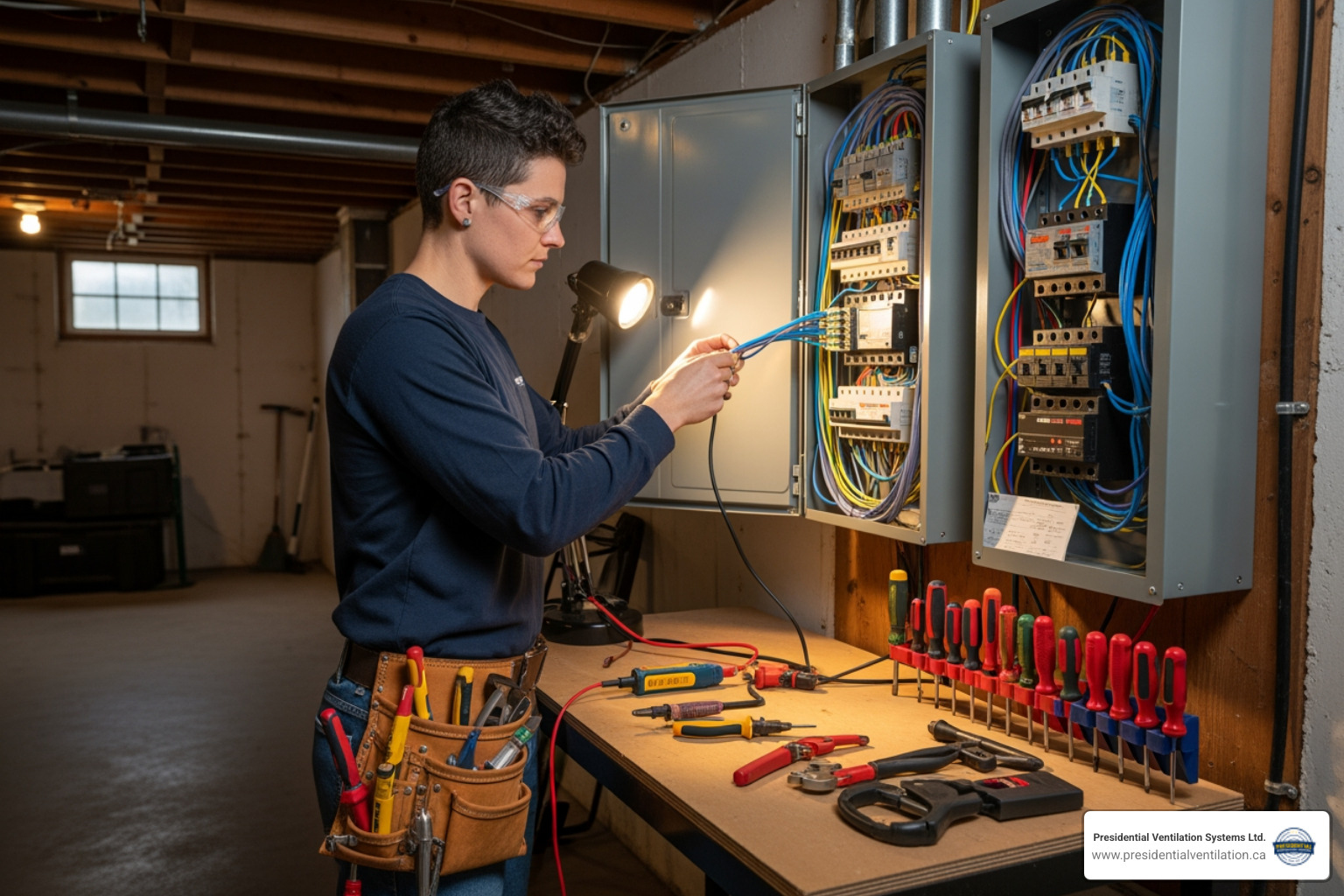
Electrical systems are the backbone of our modern lives, powering everything from our morning coffee to our evening entertainment. In Truro, like any other growing community, the demand for reliable and safe electrical services is constant. A licensed electrician in Truro, NS, is equipped to handle a vast array of jobs, ensuring your home or business operates efficiently and safely.
When we talk about electrical services, we're covering a broad spectrum. For homeowners, this often means ensuring safety and convenience, while for businesses, it's about maintaining operational efficiency and compliance. Our team at Presidential Ventilation Systems Ltd. brings over 30 years of experience, handling residential and commercial electrical needs across Truro and surrounding areas like Halifax, Dartmouth, Lower Sackville, Bedford, and Mount Uniacke.
Common residential services we see in Truro include everything from minor repairs to complete home rewiring. Businesses, on the other hand, might require specialized commercial electrical repairs, new construction wiring for a growing enterprise, or system upgrades to meet increased power demands. Whether it's a small renovation project or a large-scale new build, a qualified electrician is essential. We are adept at troubleshooting complex issues, ensuring that the root cause of any electrical problem is identified and resolved efficiently. For more in-depth knowledge, our Electrical Wiring Guide 2025 provides valuable insights into modern electrical practices.
When you call a licensed electrician in Truro, NS, you're tapping into a wealth of expertise for various crucial tasks. Here's a closer look at some of the essential services we provide to keep your property safe and functional:
Our homes and businesses are constantly evolving, integrating more technology and comfort systems. A licensed electrician in Truro, NS, is vital for ensuring these modern conveniences are powered safely and efficiently.
Finding a reliable licensed electrician in Truro, NS, is paramount for any electrical project. It's not just about getting the job done; it's about ensuring safety, compliance, and peace of mind. With so many options, knowing how to vet potential candidates is crucial.
When we look for professionals ourselves, we emphasize transparency and verifiable credentials. We recommend a similar approach for you. Start by checking their credentials, reading reviews, and asking for references. Always verify their insurance and ensure they have WCB clearance. A local electrician will also have invaluable knowledge of regional building styles and common electrical issues specific to Truro.
The "licensed" part of "licensed electrician" isn't just a formality; it's a guarantee of competence and adherence to safety standards. Here's what you should look for:
Here are some essential questions to ask a potential electrician:
When undertaking significant electrical work, obtaining the necessary permits and undergoing inspections isn't just bureaucracy; it's a critical step in safeguarding your home and investment.
Just like any other system in your home, your electrical infrastructure can age and become inadequate for modern demands. Upgrading your home's electrical system with a licensed electrician in Truro, NS, offers a multitude of benefits, enhancing safety, efficiency, and overall property value.
With over 30 years of experience, we've seen how electrical upgrades transform homes, making them safer and more capable. These upgrades are not just about fixing problems; they're about investing in the future of your property.
Your electrical panel is the heart of your home's electrical system. If it's struggling to keep up, it's a clear sign that a panel upgrade is necessary. Here are common indicators that it's time to call a licensed electrician in Truro, NS, for an assessment:
Beyond mere functionality, a licensed electrician in Truro, NS, can help you make your home more energy-efficient, saving you money and reducing your environmental footprint.
We understand you likely have questions when considering electrical work. Here are some common inquiries we address for our clients in Truro and surrounding communities.
A qualified electrician in Nova Scotia must hold a Certificate of Qualification issued by the province. This credential confirms they have met the necessary education, apprenticeship, and examination requirements. Many highly skilled electricians also possess a Red Seal Endorsement, which is a national standard recognizing their proficiency and allowing them to work across Canada. Beyond these certifications, a reputable licensed electrician in Truro, NS, must demonstrate a thorough understanding and strict adherence to the Canadian Electrical Code (CEC), as well as any specific provincial regulations or amendments that apply in Nova Scotia. They should also carry adequate liability insurance and have WCB clearance, protecting both themselves and you, the homeowner or business owner.
Hiring a local licensed electrician in Truro, NS, offers several distinct advantages. Firstly, local electricians often have an intimate understanding of the region's older building stock, common electrical issues specific to the area, and local permit requirements. This local knowledge can be invaluable for efficient troubleshooting and ensuring compliance. Secondly, local professionals typically offer faster response times, which can be crucial for any electrical issue. Finally, local electricians are deeply invested in maintaining a good reputation within their community. Their business thrives on local referrals and positive feedback, encouraging them to deliver exceptional service and build lasting relationships with clients. For us, being part of the community means we care about the quality of every job we do, from Halifax to Truro, and everywhere in between.
Preparing for an electrician's visit can make the process smoother and more efficient for everyone. To ensure a productive visit, we recommend the following steps:
When it comes to electrical work, safety should always be your top priority. Choosing a licensed electrician in Truro, NS, is not merely a recommendation; it's a necessity for protecting your property, your family, and your investment. By doing your due diligence—verifying licenses, checking insurance, and seeking local expertise—you ensure that your electrical projects are handled by qualified professionals who adhere to the highest standards of safety and quality.
A properly functioning and up-to-date electrical system provides long-term value, comfort, and peace of mind. For reliable and professional electrical work across Truro and our other service areas, the experienced team at Presidential Ventilation Systems Ltd. has the expertise to handle your electrical needs. With over 30 years in the industry, we pride ourselves on exceptional service and ensuring your electrical systems are safe, efficient, and up to code.
Contact us for your Electrical Services in Truro NS today to discuss your project and experience the difference of working with a trusted, licensed professional.
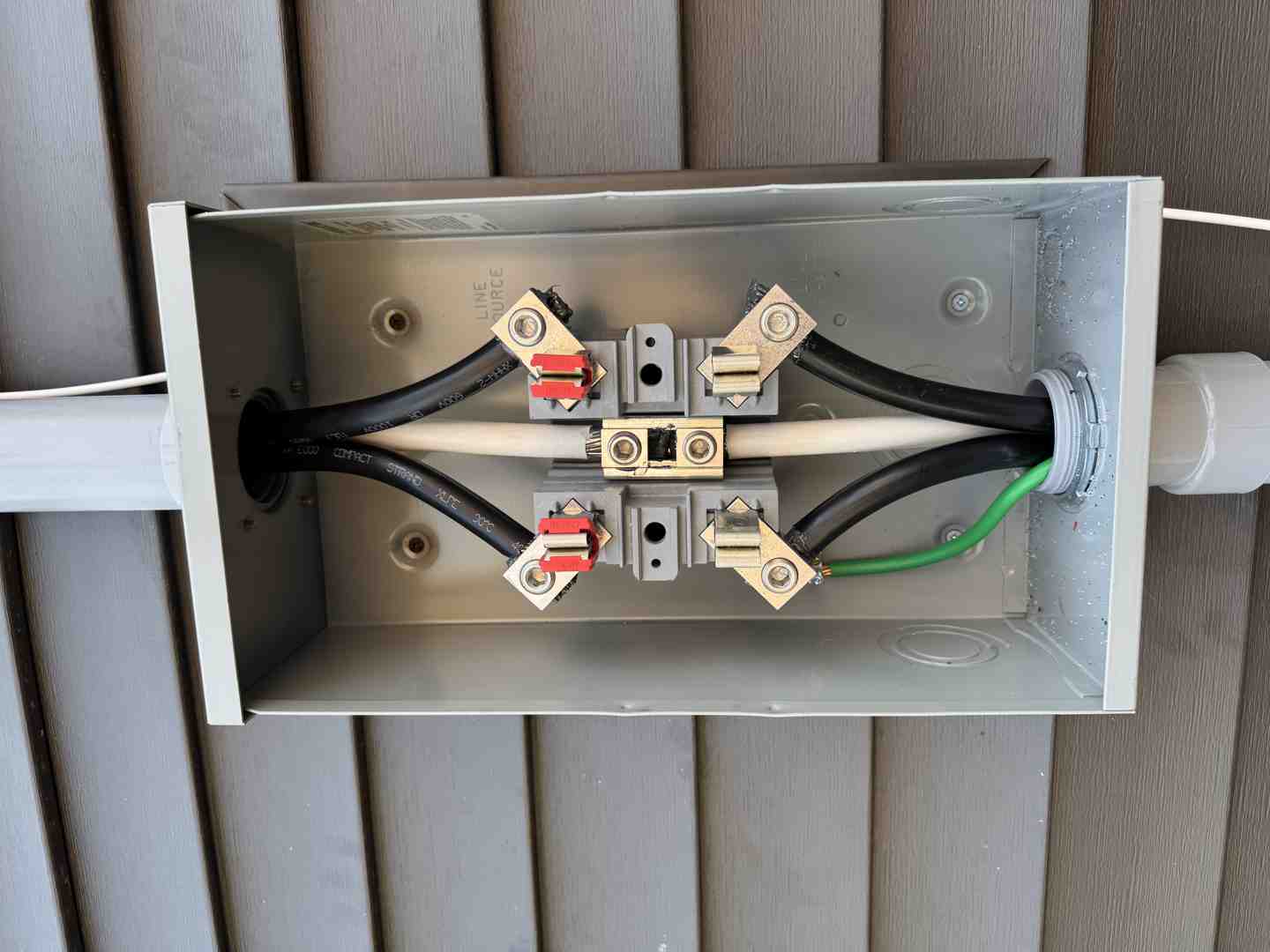


I need an electrical service upgrade for my home in Timberlea. Who are the best local electricians for the job? - this is one of the most common questions Timberlea homeowners ask, and for good reason. Older homes in the area often run on outdated 100-amp service panels that simply can't keep up with today's power demands. Whether you're adding new appliances, finishing a basement, or planning a renovation, getting the right licensed electrician makes all the difference for your home's safety and reliability.
Here is a quick overview of what to look for when choosing the best local electrician for an electrical service upgrade in Timberlea:
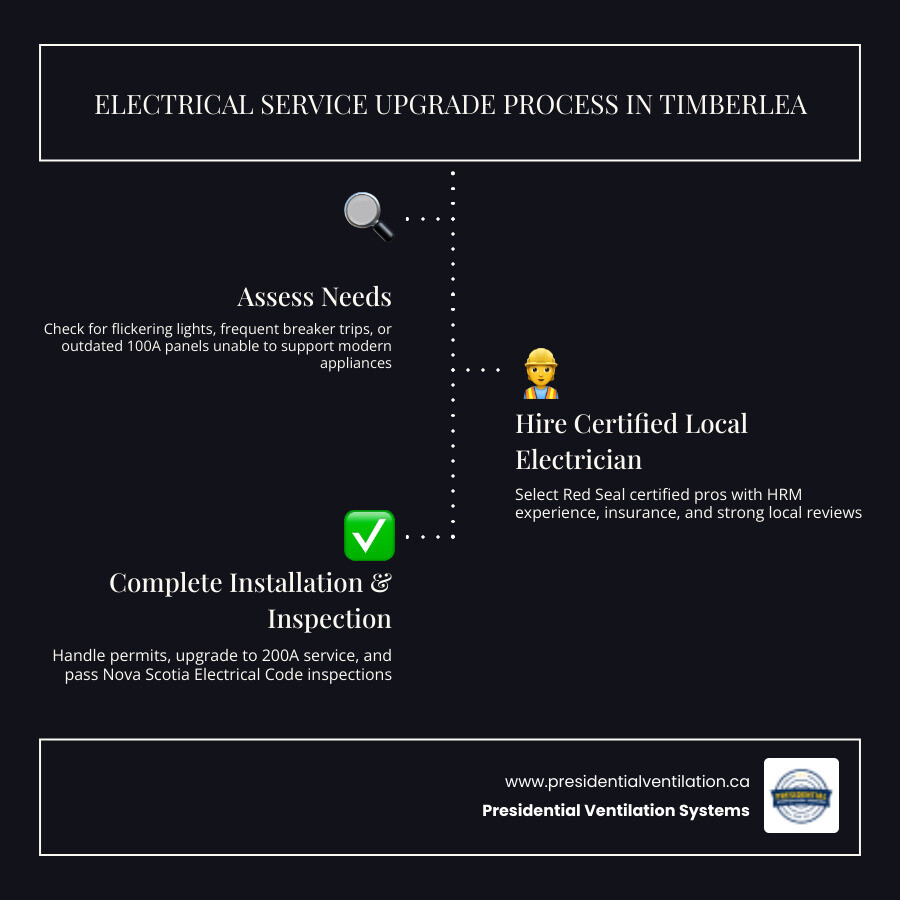
When you find yourself asking, "I need an electrical service upgrade for my home in Timberlea. Who are the best local electricians for the job?", you are looking for more than just someone who can turn a screwdriver. You are looking for a partner who understands the specific infrastructure of the Halifax Regional Municipality (HRM). Timberlea is a unique community with a mix of established older homes and rapidly growing newer subdivisions. This means the electrical needs can vary wildly from one street to the next.
At Presidential Ventilation Systems, we pride ourselves on being that local expert. With over 30 years of experience serving the HRM, we understand the nuances of Electrical Services Timberlea NS. The "best" electrician isn't just the one with the loudest advertisement; it’s the professional who shows up on time, understands the Nova Scotia Electrical Code inside and out, and treats your home with the respect it deserves.
Our team consists of certified professionals who have spent decades navigating the permit processes of the HRM and working closely with local utilities. When we step into a Timberlea home, we aren't just looking at a panel; we are looking at the heart of your home’s safety system. We ensure that every wire, breaker, and connection is optimized for modern living.
Why is everyone in Timberlea suddenly talking about 200-amp service? It’s not just a trend; it’s a necessity born from the way we live now. Many homes in Timberlea were built during an era when a "heavy load" meant running a toaster and a vacuum at the same time. Today, our homes are power-hungry hubs of technology.
The most common reason for an upgrade is moving from 100A to 200A service. A 100-amp panel is often sufficient for a small home with basic appliances, but as soon as you add modern luxuries, that capacity disappears. An Electrical Panel Upgrade provides the "headroom" your home needs to function without constantly tripping breakers or flickering lights.
Here are a few specific reasons why Timberlea residents are reaching out for upgrades:
If you are planning a residential renovation, the question of "I need an electrical service upgrade for my home in Timberlea. Who are the best local electricians for the job?" becomes even more urgent. Whether you are finishing a basement in Beechville or adding an extension in Timberlea, your existing wiring might not be up to the task.
We often see homeowners in nearby areas like Bedford and Halifax facing similar challenges. Modern renovations usually involve adding significant numbers of "pot lights," heated flooring, or high-end HVAC systems. These additions require a robust electrical backbone. By securing Electrical Services Halifax NS or Electrical Services Bedford NS through a trusted local provider, you ensure that your renovation is built on a foundation of safety.
So, how do you actually separate the pros from the amateurs? In Nova Scotia, the gold standard is the Red Seal certification. A Red Seal electrician has undergone rigorous training and passed a national exam that proves they are a master of their craft. When you hire someone, always ask if they are certified by the Nova Scotia Apprenticeship Agency.
You can also use tools like the Find a Contractor tool provided by the local utility to find vetted professionals. However, a tool is only the first step. You should also look for:
When searching for the best, don't ignore vetted professional networks. Many homeowners find peace of mind by choosing contractors who are part of established manufacturer programs or local directories that require high customer satisfaction ratings.
Experience in the local area is irreplaceable. An electrician who has performed dozens of upgrades in Dartmouth will be familiar with the specific utility hookup requirements in that area, just as we are familiar with the specific needs of Timberlea. If you need Electrical Services Dartmouth NS, you want a team that knows the local inspectors by name and understands the fastest way to get your power back on after the utility disconnect.
In Nova Scotia, electrical work isn't a "handyman" job. It is strictly regulated by the Nova Scotia Electrical Code. This code is designed to keep your family safe from fire and shock hazards.
When we perform a service upgrade in Timberlea, the process follows a strict legal path:
We also highly recommend including surge suppression as part of any panel upgrade. With the increase in sensitive electronics in our homes, a whole-home surge protector installed directly into your new panel can protect your appliances from damage during a lightning storm or power surge. Whether you are looking for Electrical Services Canada or more localized Electrical Services Lower Sackville NS, always insist on a permit and a final inspection.
To help you decide if an upgrade is right for you, we've put together a comparison of the two most common service levels found in Timberlea homes.
| Feature | 100 Amp Service | 200 Amp Service |
|---|---|---|
| Capacity | Basic household needs | High-demand modern homes |
| EV Charging | Limited / Difficult | Ideal for Level 2 chargers |
| Future Proofing | Low | High |
| Appliance Load | Standard appliances only | Multiple high-draw appliances |
| Home Value | Standard | Increased resale appeal |
One of the biggest concerns homeowners have is how long they will be without power. Typically, the actual installation takes about 4 to 8 hours. During this window, your power will be completely turned off. We coordinate with the utility to ensure they arrive shortly after we finish to reconnect the service. The final inspection usually happens within a day or two of the installation, though your power will be back on long before the inspector arrives.
If you notice your lights flickering when the refrigerator kicks on, or if you find yourself constantly walking to the basement to flip a tripped breaker, your panel is telling you it's overwhelmed. Other warning signs include:
Yes, absolutely. In Nova Scotia, it is illegal to perform a service or panel upgrade without a permit. More importantly, if you have an electrical fire and the insurance company discovers that the work was done without a permit or inspection, they may deny your claim. The "best" electricians will always include the permit process in their service—never trust a contractor who asks you to pull the permit or suggests doing the job "off the books."
Choosing the right partner for your home’s electrical system is a decision that impacts your safety, comfort, and property value for years to come. When you find yourself thinking, "I need an electrical service upgrade for my home in Timberlea. Who are the best local electricians for the job?", Presidential Ventilation Systems has been the trusted choice in the HRM for over 30 years.
We bring a combination of deep local knowledge, Red Seal expertise, and a commitment to doing the job right the first time. From handling the paperwork to ensuring your home is cleaner than when we arrived, we make the upgrade process seamless. If you're ready to power up your home for the future, contact us today to learn more about our Electrical Services Timberlea NS. Let us help you keep your home safe, efficient, and ready for whatever modern technology comes next!